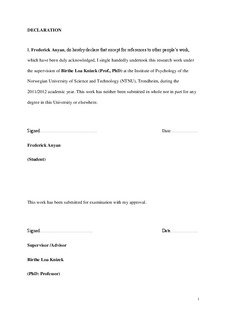| dc.contributor.advisor | Knizek, Birthe Loa | nb_NO |
| dc.contributor.author | Anyan, Frederick | nb_NO |
| dc.date.accessioned | 2014-12-19T14:42:23Z | |
| dc.date.available | 2014-12-19T14:42:23Z | |
| dc.date.created | 2012-05-25 | nb_NO |
| dc.date.issued | 2012 | nb_NO |
| dc.identifier | 528482 | nb_NO |
| dc.identifier.uri | http://hdl.handle.net/11250/270824 | |
| dc.description.abstract | This study explores gender differences in essential hypertension patients’ understanding of illness, their reaction to diagnosis, their health motivation and how they cope and deal with their condition by drawing on recorded interviews in a qualitative methodology. A semi-structured interview guide was used. Interpretative phenomenological analysis of the data indicated both men and women respondents conceptualised illness in terms of impairment in physiological functioning, as well as a loss of strength and capacity to work by men respondents and a loss of social exploration by women respondents. In health motivation, women respondents were somewhat relatively motivated differently from men respondents. Women respondents reacted less negative and admitted symptomatology upon learning about their diagnosis while men respondents dismissed symptomatology even though they recognised the validity of the diagnosis. Women respondents seemed to have a stronger perceived health competence than men respondents. Implications of the findings for intervention are discussed such as the practice of preventive health behaviour, physicians’ attentiveness to their role in the therapeutic process and the advancement of religious practices and faith in whole-person medicine practice. | nb_NO |
| dc.language | eng | nb_NO |
| dc.publisher | Norges teknisk-naturvitenskapelige universitet, Fakultet for samfunnsvitenskap og teknologiledelse, Psykologisk institutt | nb_NO |
| dc.subject | Social and Behavioural Science, Law | en_GB |
| dc.title | Gender differences in sick role behavior of essential hypertension patiens and the implications for intervention: a comparative study of middle aged patiens at Korle Bu polyclinic Accra, Ghana | nb_NO |
| dc.type | Master thesis | nb_NO |
| dc.source.pagenumber | 129 | nb_NO |
| dc.contributor.department | Norges teknisk-naturvitenskapelige universitet, Fakultet for samfunnsvitenskap og teknologiledelse, Psykologisk institutt | nb_NO |
